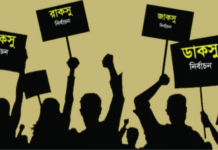
“Fundamentally, I think, progress has been achieved…the set of recommendations that I made were incorporated. But I’m very concerned about the death penalty,” he told a press conference at the American Centre in the city.
Rapp, however, said there is still concern regarding systemic errors in the trial process and mentioned that the international standards are yet to be ensured fully.
Pressed for specific comments whether he is happy or not over the four verdicts, he said, “I’m not satisfied… I (also) do have satisfaction. But I think there is progress.”
US Ambassador in Dhaka Dan W Mozena and Press and Information Officer, US Embassy in Dhaka, Kelly S McCarthy were also present.
Responding to a question Rapp said he has to have trust judges to make decisions, and mentioned that people may not be happy, and can be emotional. “My hope and expectation are that the cases will be decided on the facts, not on polls, politics, or not on demonstrations (Shahbagh).
There is no scope to influence the trial process by violence and demonstrations or rallies, he said.
Asked again whether he is happy over the verdicts, he said the process is done. “It’s not me to say what I like particularly or dislike.”
He also said he does not want to get involved in this specific issue and it is up to them [judges] to make things clear with supportive facts against particular convictions.
Asked whether the verdicts were influenced by the Shahbagh movements Rapp said the Shahbagh movement had happened after Mollah (Quader Mollah) verdict. “Again I trust in judges…judges do not respond to politics…they respond to facts and laws.”
He also said in political process that may reflect on the decisions in terms of legislation as the legislators naturally respond to people.
On continuation of the trial, even after the change of power, Rapp said the trial is going to continue whatever happens in this election. “It’s my expectation, it would continue.”
He said this is a process and it should be done in such a way that it is not a question which party is in power but a question of establishing justice.
Rapp emphasised the proper scopes for the accused to defend and said allegations brought against the accused will have to be proved beyond question.
He highlighted four recommendations including maintaining international standards in the trial process and transparent trial and protection of accused’s social and political rights in line with the international convention.
Rapp said it is a historic process and hoped that the trial will yield results at the end and establish an example in the world.
Rapp had been in Dhaka thrice in 2011 to provide suggestions for the trial of war crimes suspects.
This time he came here on a two-day visit and witnessed the trial proceedings in the International Crimes Tribunals and trial process in the Supreme Court.
He also held a meeting with Law Minister Barrister Shafique Ahmed at the Secretariat.










Mr. Rap has expressed satisfaction about the progress/process of ICT’s handing down death sentences to those involved in crimes against humanity. That sounds good enough but there is a news report that one defense witness, Sukharanjan Bali by name, lifted from the court gate and was not heard of since, has lately been ‘discovered’ in a penitentiary in West Bengal, India. Secondly, the court accepted ‘written statements’ of 14/15 prosecution witnesses whom the defense was not given the opportunity to cross-examine, the matter which was termed as ‘unprecedented’ by the defense. Even after that, the accused was awarded capital punishment. Do these two things indicate that fairness and transparency in the trial process have been maintained? We heard Mr. Rap, Mr. David Bergman, Lord Avebury etc expressed their skepticism about the fairness of the trial but now that Mr. Rap seems to have changed his position, public skepticism has deepened about Mr. Raps actual view. Is there any mystery about Mr. Rap changing his stance?